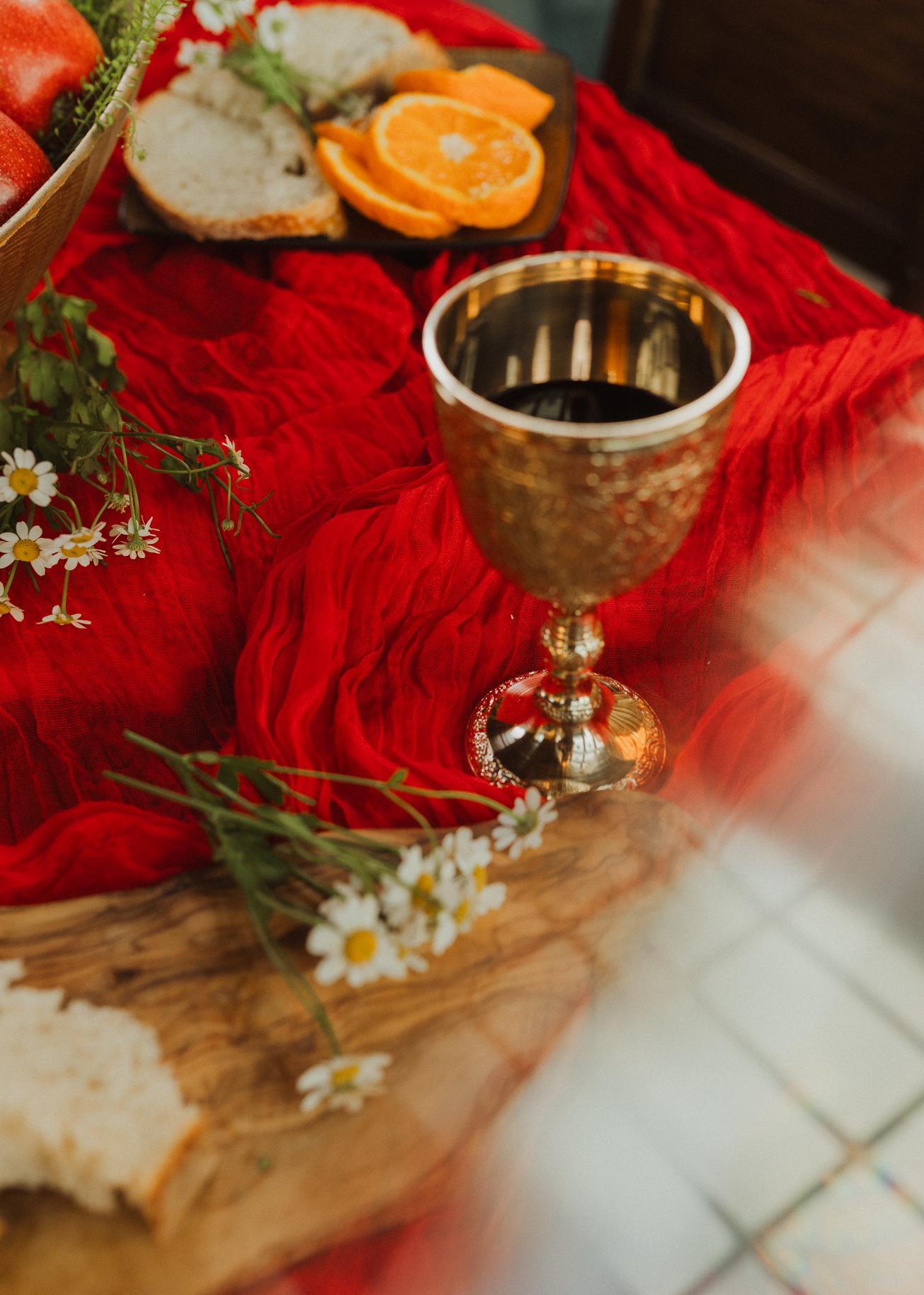

Holy Week Devotional
In honor of Holy Week, we’re coming together as a church to focus and reflect on the week leading up to Jesus’ crucifixion and resurrection. Whether you plan to read it on your own or join us online for discussion and prayer, we pray that this devotional allows you to pause this Easter week and consider what Christ did to bring us back into relationship with God.
“Therefore, if anyone is in Christ, he is a new creation. The old has passed away; behold, the new has come. All this is from God, who through Christ reconciled us to himself and gave us the ministry of reconciliation.”
2 Corinthians 5:17-18 (ESV)

Palm SundayTriumphal Entry

Scripture: Matthew 21:1-11, Mark 11:1-11, Luke 19:28-44, John 12:12-19
Thought:
The day Jesus rode into Jerusalem is often referred to as His Triumphal Entry. The crowd that attended “The Jesus Parade” were filled with mixed emotions and confusion. Human emotion included cheers, jeers, fears, and tears. The cheers echoed from the friends and followers of Jesus and the jeers that mocked were from the mouths of His enemies. The literal meaning of the word Hosanna is a cry “Save Us or Deliver Us.” Many who were present on the parade route hoped that Jesus would be the political King that would deliver them from the brutal treatment they faced daily at the hands of the Roman Government. Their cheers on Sunday turned to fear and tears on Friday because they did not understand that Jesus was a King of another kind of kingdom, a spiritual kingdom. Their prayers for deliverance from a human government would be denied for the moment but their freedom from the power of sinful bondage would be delivered on Sunday. They did not understand that the bondage of sin was greater than the power of Rome and Christ’s mission was to save them from the power of a sinful, broken life with His death on cross. The price for their redemption would be paid and delivered at the hands of the very government that persecuted them.
Questions:
Sometimes God’s ways are confusing because we don’t understand or see His greater purpose or plan when experiencing pain. What kinds of confusion or disappointment am I experiencing as it relates to what is happening in my life? What are my questions as to His higher purpose? You don’t have to be afraid to ask. He is listening and wants you to be free to reach out to Him, even with your hard questions.
Guided Prayer:
Dear Father in Heaven, thank you for sending your son Jesus to show me how much you love me evidenced by His death on the Cross. However, in all honesty, I need hope, comfort, and wisdom to handle and process the questions and confusion that I face today. I choose to trust you even when I don’t understand your ways and today in the face of my fears and tears, I praise you for who You are and will walk with trust in Your Sovereign Plan for my life. Amen.
Holy Monday
You are the Temple

Scripture: Matthew 21:12–22, Mark 11:15–19, Luke 19:45-48, John 2:13-17
Thought:
Some of the most magnificent structures constructed in Europe are cathedrals, which were once a place for spiritual life, and are now sometimes thought of as museums. What happened? How does a vital life-giving congregation die? Jesus addressed that question on Holy Monday when He visited one of the synagogues in Jerusalem and witnessed the House of God had become a shopping center, open for business, and exploiting the people’s faith and the poor. Jesus reveals His outrage by taking a whip and driving out the money changers for violating God’s intended purpose. Jesus states the purpose of a House of Worship with these words: “My house shall be called a house of prayer.” This is why we reserve a time in our worship services for inviting people to come to the altar for prayer. Pastor Greg says “prayer is not the least we can do, it is the most.” Prayer is the means for connecting with God and accessing His power, provision and presence.
In 1 Corinthians 6:19, the Apostle Paul compares our body to being the temple of God. One implied question that this lesson asks us is, are there areas of our life that need to be addressed so that our temple is living out its intended purpose, a place of prayerful communion with God? Holy week is an appropriate opportunity to look at our hearts and honestly ask, in the activities of my daily rhythms, how important is prayer as part of my walk with Christ? This question is not to ignite shame or guilt but to remind us that prayer is the key to living a vital and victorious life.
Questions:
Since my body is the place where God lives, are there areas of my life that I need to repent, that will free me to be more connected to Jesus? What steps can I take to make my life more effective as a “house of prayer”?
Guided Prayer:
Jesus, please reveal to me anything in my life that is displeasing to you and is bringing spiritual death rather than life to my walk with You. Give me the power to repent and to recommit to making You the Lord of my life. Make my heart a sanctuary where Your presence and power in my life testify to those around me who need your forgiveness and healing. Amen.
Courageous Tuesday Anointed King

Scripture: Matthew 26:6-13, Mark 14:1-9, John 12:1-8
Thought:
On Tuesday morning, Jesus sat at the table of Simon the Leper, reclining with His disciples and friends, when Mary entered, holding an alabaster jar of costly perfume. Without hesitation, she poured it on His feet and wiped them with her hair, a profoundly intimate act of devotion. Unfazed by the judgment of those around her, Mary poured out her love for Jesus in a way that would not be silenced or contained. What a bold, extravagant expression of love this was, witnessed by all.
Matthew and Mark highlight the prophetic significance of this anointing, alluding to Jesus’ coming death and burial. In the Old Testament, the anointing of a king’s head was a sign of consecration and kingship (1 Samuel 9:15—10:1; 16:12–13, 1 Kings 1:38–40). Mary’s anointing of Jesus, however, also points to His dual identity: the Messiah-King, whose reign is marked by both sovereignty and servanthood. When Mary anointed His feet and wiped them with her hair, she foreshadowed Jesus’ humble act of washing His disciples’ feet at the Last Supper (John 13:1–20), embodying both His kingship and servanthood.
The word “Messiah” means “the anointed one,” and it comes from the Hebrew word for anointing, while “Christ” derives from the Greek “Christos,” meaning the same. Jesus Christ is God’s anointed Messiah, the one chosen to bring salvation to the world.
Mary’s act serves as a powerful example of courage and conviction. In the face of cultural expectations and criticism, she remained steadfast in her faith, led by the Holy Spirit to boldly love and honor Jesus. Her courageous devotion is a witness to all of us—there is no greater testimony than standing firm in our faith, even when it goes against the tide of society. Mary’s love was not only a bold act of worship, but a powerful declaration of who Jesus truly is: the Anointed One, the Messiah, the Servant-King.
Questions:
What areas of my life am I holding back my love and witness for Christ? How can I be passionate about my faith and compassionate towards those around me so that they feel God’s love and grace without judgment?
Guided Prayer:
Lord, use my life, I pray, and give me the courage to be a good and faithful witness to Jesus, in word and deed. Help me to pour my love over you regardless of who is watching in Jesus’ name. Amen
Silent Wednesday Rest & Reflection

Scripture: Mark 6:30-31, Matthew 11:28-30, John 17:24
Thought:
The Bible doesn’t specify what Jesus did on Silent Wednesday of Holy Week, leading scholars speculate that He and His disciples rested in Bethany in preparation for Passover. The lack of detail in the Gospels is a mystery, but it invites us to reflect on the possibility that Jesus took this time to rest. After two intense days in Jerusalem, filled with teaching, healing, and confrontations with religious leaders, He may have known the coming days—full of betrayal, suffering, and the cross—would be exhausting. Was Jesus taking time to rest, knowing the rest of the week would be exhausting? This is an idea worth considering.
Jesus often withdrew to be alone with the Father and rest with His disciples (Mark 6:30-31), and it’s likely He did the same here. Though we don’t have a record of this time, we can trust that He spent it loving those the Father gave Him (John 17:24).
Silent Wednesday could serve as an invitation for us to pause. We live in a world of constant activity and noise, and observing a day of rest or reflection during this time, much like Jesus might have, can provide spiritual renewal. Jesus offering rest to all who come to Him (Matt 11:28-30) is a powerful reminder that amidst life’s busyness, He gives us the gift of rest and peace. Taking time to connect with God and reflect on the journey of Holy Week is a meaningful practice for both physical and spiritual renewal.
Questions:
What areas of my life are out of balance and need rest? What can I do to take the time to worship, rest, and play? In my life, which relationships with those I love the most, receive my leftovers instead of my best?
Guided Prayer:
Lord, help me find my rest in you. Help me to pay attention to my soul as well as my body. Help me to hear your gentle voice above all the others that clamor for my attention. You will show me those things you want me to do, and you will be right there beside me as I do them, giving me strength. Amen
Humble Thursday A Love Beyond Measure

Scripture: Matthew 26:17–75, Mark 14:12-72, Luke 22:7-62, John 13:1-38
Thought:
The greatest act of love was about to unfold as Jesus shared the Passover meal with His disciples. As the Lamb of God, He was preparing to fulfill the ultimate purpose of Passover — offering His body to be broken and His blood to be poured out as a sacrifice for the sins of the world (Luke 22:44). In this pivotal moment, His love was on display in the most profound way.
But before that ultimate sacrifice, Jesus chose to do something unthinkable. On His final night with His disciples, He stripped off His outer robe, a symbol of His divine authority, and took on the role of a humble servant. He washed His disciples’ feet — even the feet of Judas Iscariot, who was about to betray Him. That act was more than a physical gesture; it was an embodiment of love that went beyond human understanding. Jesus, knowing the pain Judas would bring, still knelt before him in an act of deep, unconditional love.
Jesus’ humility and love weren’t just shown through this physical act. As He washed their feet, He also spoke words that would echo through time: “A new commandment I give to you, love one another as I have loved you” (John 13:34). In those simple words, He set a standard — to love as He loved, without hesitation, without boundaries, even in the face of betrayal. (Luke 6:32). True love, the love Jesus showed, is willing to love those who don’t deserve it, to serve even when it costs us.
Questions:
Do I only love the ones who love me back? What are some ways that you can love people who are hard to love? What next steps can I take to follow Jesus’ example of loving someone who hurt me?
Guided Prayer:
Jesus, help me not only love like you but to demonstrate love like you. Not only those close to me and the easiest to love but also those who are difficult to love. Help me see You in the eyes of those I struggle to love. May everyone know that we belong to you because of how we love one another.
Good Friday A Good & Dark Friday

Scripture: Matthew 27:1-62, Mark 15:1-47, Luke 22:63-23:56, John 18:28-19:37
Thought:
Good Friday is often viewed as a solemn occasion, one filled with pain, suffering, and sorrow. When we look at the words that describe Christ’s Friday schedule— trial, crucifixion, death, and burial—they seem to paint a picture of a tragic day, a day that doesn’t naturally fit the label of “good.” Indeed, as Matthew’s Gospel records, from noon until 3pm, darkness covered Jerusalem (Matthew 27:45). This wasn’t just a physical darkness but a symbolic one, representing the evil and sin that Jesus bore upon Himself at Golgotha.
Despite the sorrow of Good Friday, it holds deep significance. The events of Christ’s trial, crucifixion, and death fulfilled Old Testament prophecies of the suffering Messiah. In this darkness, Christ’s goodness shone, offering forgiveness through His blood and the hope of eternal life. Without this sacrifice, redemption would be impossible. That’s the “good” in Good Friday. Life brings seasons of darkness—disappointment, discouragement, and despair. But just as Christ’s suffering didn’t end in defeat, neither do our struggles. The Gospel reminds us that “it came to pass”—our trials are temporary.
Pastor Greg’s sermon series, Master’s Degree, offers a powerful reminder on how to navigate these times of darkness: pray, process, and persevere. By doing so, we open ourselves to discovering God’s greater purpose in the midst of life’s trials. So, on this Good Friday, let’s hold onto the promise that even in the darkest moments, God is working for our good. Through prayer, processing our emotions, and persevering in faith, we can experience the light that pierces through the darkness.
Questions:
What is an area of darkness or despair I am currently wrestling through? What could be God’s higher purpose for the dark clouds? What can I praise God for in the midst of the storm/darkness?
Guided Prayer:
Father, when there is darkness in my life I find it difficult to pray or praise you and to believe the sunshine of hope will shine again. My sadness brings tears that often blur my ability to see your hands at work in my life and fear compounds my despondency. Today I choose to turn my face and faith toward Heaven and know you are holding me in your loving arms of Grace. Amen.
Hidden Saturday To Hell & Back

Scripture: Matthew 27:62-66, Mark 16:1, Luke 23:56, John 19:40
Thoughts:
In the words of the great theologian Elvis Presley, on Saturday there was a whole lotta shakin’ goin on. The disciples were shaking for fear of being visited by the Roman Government, and their faith was shaken because the death of Jesus was now a reality. On Saturday, all over the city of Jerusalem the aftermath of an earthquake and the aftershocks that had occurred the day before were visible, (Matt. 27:51). But there was a greater shaking going on in Hell on Saturday. By Saturday, Satan knew that Jesus’ death was only temporary.
There are some theologians who believe that on Saturday Jesus paid Hell a visit. He took the keys of death and took back the authority of Satan who used these keys as the prince and power of the air. Now Satan and his army of demonic powers tremble with fear and at the Name of Jesus.
One of Satan’s tools that is used against God’s people is fear. 1 John 4:18 says fear brings a tormenting presence but it is also true, God has not given His children a spirit of fear, but God’s love overpowers it. Yes, there are times when we experience those earth shattering moments and fears rise up, but Jesus modeled in Luke 4 during His wilderness experience how to use God’s word as our defense against the accusing voice of Satan. If you find yourself hiding behind the doors of fear, remember Jesus has given us His keys of authority to resist the lying voice of the evil one with the truth of God’s word. Jesus went to hell and back to give you His keys, today is a good day to use those keys to unlock the door of fear.
Questions:
What fear do I need to target for prayer in my life? What passages of Scripture speak to the area(s) that the enemy uses to keep me in bondage to the unknown? Who can I ask to be a partner in prayer with me to believe God for greater things in my life?
Guided Prayer:
Father, I come to you in the powerful name of Jesus with a belief and confidence that you are greater in me than anything I face in this world. Today, I take the keys of your authority and declare that no weapon formed against me will prosper. I am free from any bondage to fear and, by faith, declare I am hidden in Christ! Amen.


